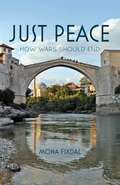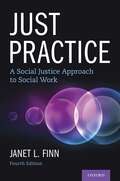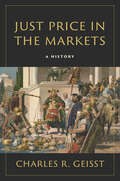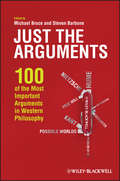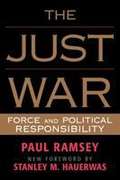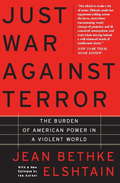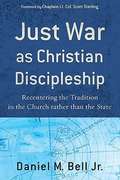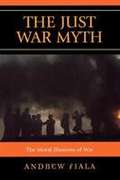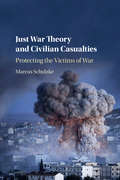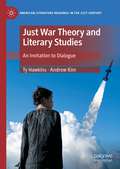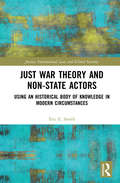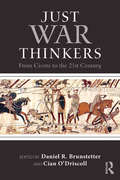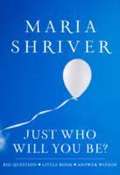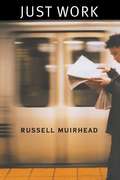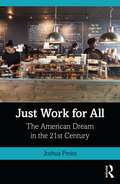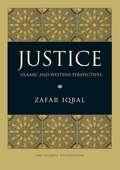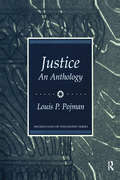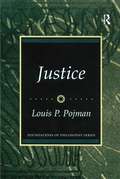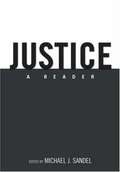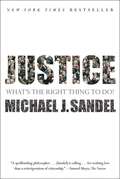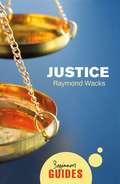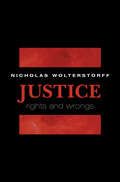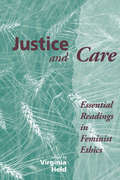- Table View
- List View
Just Peace
by Mona FixdalDrawing on many of the wars and peaces of recent decades, this book offers a persuasive new perspective on postwar justice. In her analysis wars of succession, wars for territory, and the political institutions that precede and follow wars, Fixdal explores the outer limits of the idea that it is worth paying almost any price for peace.
Just Practice: A Social Justice Approach to Social Work
by Janet L. FinnJust Practice: A Social Justice Approach to Social Work provides a foundation for critical and creative social work that integrates theory, history, ethics, skills, and rights to respond to the complex terrain of 21st century social work. Just Practice puts the field of social work's expressed commitment to social justice at center stage with a framework that builds upon five key concepts: meaning, context, power, history, and possibility. How do we give meaning to the experiences and conditions that shape our lives? What are the contexts in which those experiences and conditions occur? How do structures and relations of power shape people's lives and the practice of social work? How might a historical perspective help us to grasp the ways in which struggles over meaning and power have played out and to better appreciate the human consequences of those struggles? Taken together, these concepts provide a guide for integrative social work that bridges direct practice and community building. The text prepares readers with the theoretical knowledge and practice skills to address the complex challenges of contemporary social work from direct practice with individuals and families, to group work, organizational and community change, and policy analysis and advocacy. Each chapter includes learning activities, reflection moments, practice examples, and the stories and voices of practitioners and service users to engage students as critical thinkers and practitioners. The author encourages teachers and students alike to take risks, move from safe, familiar, pedagogical spaces and practices, challenge assumptions, and embrace uncertainty.
Just Price in the Markets: A History
by Charles R. GeisstA concise history of “just price,” from Aristotle to the present day The question of what constitutes a fair price has been at the center of market interactions since the time of Aristotle. Should a seller sell to the highest bidder, or is there some other standard, such as a morally defined price, to be applied? Charles R. Geisst traces the ways that philosophers, religious leaders, and economists have sought to answer that question, from antiquity through the modern era. Aristotle’s thinking on usury influenced the idea of pricing well into the Renaissance. In his view, money was barren and should not be used to beget more money. As trade became more extensive, the strictures placed on pricing by Aristotelian thinking began to fall away, replaced by Roman and common-law conceptions of value and interest. Geisst’s book follows the evolution of that thought—influenced along the way by figures such as Copernicus, Fibonacci, Adam Smith, Marx, Cassel, and Keynes—and charts parallel developments in European and Islamic notions of fair pricing. Today, pricing is seen as an economic inevitability, dictated by the laws of supply and demand. But this has not always been the case. As Geisst argues, the idea of a just price was once a moral concept, long before it was an economic one.
Just the Arguments: 100 of the Most Important Arguments in Western Philosophy
by Michael Bruce Steven BarboneDoes the existence of evil call into doubt the existence of God? Show me the argument. Philosophy starts with questions, but attempts at answers are just as important, and these answers require reasoned argument. Cutting through dense philosophical prose, 100 famous and influential arguments are presented in their essence, with premises, conclusions and logical form plainly identified. Key quotations provide a sense of style and approach. Just the Arguments is an invaluable one-stop argument shop. A concise, formally structured summation of 100 of the most important arguments in Western philosophy The first book of its kind to present the most important and influential philosophical arguments in a clear premise/conclusion format, the language that philosophers use and students are expected to know Offers succinct expositions of key philosophical arguments without bogging them down in commentary Translates difficult texts to core arguments Designed to provides a quick and compact reference to everything from Aquinas’ “Five Ways” to prove the existence of God, to the metaphysical possibilities of a zombie world
The Just War: Force and Political Responsibility
by Paul RamseyRecent conflicts, such as the Persian Gulf War of the 1990s and the war against the Taliban in Afghanistan in 2001 show that the idea of what constitutes a 'just war' remains a crucial issue in politics and ethics today. With a new foreword by noted theologian and ethicist Stanley Hauerwas, this classic text on war and the ethics of modern statecraft written at the height of the Vietnam era in 1968 speaks to a new generation of readers.
Just War Against Terror: The Burden Of American Power In A Violent World
by Jean ElshtainJean Bethke Elshtain advocates "just war" in times of crisis and mounts a reasoned attack against the anti-war contingent in American intellectual life. Advocating an ethic of responsibility, Elshtain forces us to ask tough questions not only about the nature of terrorism, but about ourselves. This paperback edition features a new introduction by the author, addressing the Iraq war and other events in the Middle East.
Just War Against Terror: The Burden of American Power in a Violent World
by Jean Bethke ElshtainAnalysis of the demands arising from the terror of 9-11.
Just War and International Order
by Nicholas RenggerAt the opening of the twenty-first century, while obviously the world is still struggling with violence and conflict, many commentators argue that there are many reasons for supposing that restrictions on the use of force are growing. The establishment of the International Criminal Court, the growing sophistication of international humanitarian law and the 'rebirth' of the just war tradition over the last fifty years are all taken as signs of this trend. This book argues that, on the contrary, the just war tradition, allied to a historically powerful and increasingly dominant conception of politics in general, is complicit with an expansion of the grounds of supposedly legitimate force, rather than a restriction of it. In offering a critique of this trajectory, 'Just War and International Order' also seeks to illuminate a worrying trend for international order more generally and consider what, if any, alternative there might be to it.
Just War as Christian Discipleship: Recentering the Tradition in the Church rather than the State
by Daniel M. BellThis provocative and timely primer on the just war tradition connects just war to the concrete practices and challenges of the Christian life. Daniel Bell explains that the point is not simply to know the just war tradition but to live it even in the face of the tremendous difficulties associated with war. He shows how just war practice, if it is to be understood as a faithful form of Christian discipleship, must be rooted in and shaped by the fundamental convictions and confessions of the faith. The book includes a foreword by an Army chaplain, Scott Sterling, who has served in Iraq and study questions for group use.
The Just War Myth: The Moral Illusions of War
by Andrew FialaThe Just War Myth argues that while the just war theory is a good theory, actual wars do not live up to its standards. The book provides a genealogy of the just war idea and also turns a critical eye on current events, including the idea of preemptive war, the use of torture, and the unreality of the Bush Doctrine. Fiala warns that pacifism, too, can become mythological, advocating skepticism about attempts to justify war.
Just War Theory and Civilian Casualties: Protecting the Victims of War
by Marcus SchulzkeThere are strong moral and legal pressures against harming civilians in times of conflict, yet neither just war theory nor international law is clear about what responsibilities belligerents have to correct harm once it has been inflicted. In this book, Marcus Schulzke argues that military powers have a duty to provide assistance to the civilians they attack during wars, and that this duty is entailed by civilians' right to life. Schulzke develops new just war principles requiring belligerents to provide medical treatment and financial compensation to civilian victims, and then shows how these principles can be implemented in governmental, military, and international practice. He calls for a more individual-focused conception of international law and post-war justice for victims - as opposed to current state- or group-based reconstruction and reparation programs - which will provide a framework for protecting civilian rights.
Just War Theory and Literary Studies: An Invitation to Dialogue (American Literature Readings in the 21st Century)
by Andrew Kim Ty HawkinsThis book questions when, why, and how it is just for a people to go to war, or to refrain from warring, in a post-9/11 world. To do so, it explores Just War Theory (JWT) in relationship to recent American accounts of the experience of war. The book analyses the jus ad bellum criteria of just war—right intention, legitimate authority, just cause, probability of success, and last resort—before exploring jus in bello, or the law that governs the way in which warfare is conducted. By combining just-war ethics and sustained explorations of major works of twentieth and twenty-first century American war writing, this study offers the first book-length reflection on how JWT and literary studies can inform one another fruitfully.
Just War Theory and Non-State Actors: Using an Historical Body of Knowledge in Modern Circumstances (Justice, International Law and Global Security)
by Eric E. SmithThis book uses an historical body of knowledge, Just War Theory, as the basis for analyzing modern conflicts involving Armed Non-State Actors who employ force against states. As the global community faces the challenges of globalization, terrorism, 24-hour international news coverage, super power collapse, weapons of mass destruction, and failed states, the author explores whether the historic bodies of knowledge governing decision makers during conflict remain relevant. Tracing the evolution of Just War Theory, he analyzes circumstances involving Armed Non-State Actor (ANSA) groups possessing powerful and destructive capabilities and a desire to use them, and pursues answers to the central research question: how does Just War Theory apply in modern scenarios involving ANSA groups who challenge the state and international institution’s monopoly on use of force? The study finds that Just War Theory still has the capacity to accommodate modern day statecraft and application in scenarios involving Armed Non-State Actors. This book will be of great interest to those researching and studying in the fields of political theory, security studies, international relations, war and conflict studies, and public ethics.
Just War Thinkers: From Cicero to the 21st Century (War, Conflict and Ethics)
by Daniel R. Brunstetter Cian O’DriscollThis volume offers a set of concise and accessible introductions to the seminal figures in the historical development of the just war tradition. In what, if any, circumstances are political communities justified in going to war? And what limits should apply to the conduct of any such war? The just war tradition is a body of thought that helps us think through these very questions. Its core ideas have been subject to fierce debate for over 2,000 years. Yet they continue to play a prominent role in how political and military leaders address the challenges posed by the use of force in international society. Until now there has been no text that offers concise and accessible introductions to the key figures associated with the tradition. Stepping into this breach, Just War Thinkers provides a set of clear but detailed essays by leading experts on nineteen seminal thinkers, from Cicero to Jeff McMahan. This volume challenges the reader to think about how traditions are constituted—who is included and excluded, and how that is determined—and how they serve to enable, constrain, and indeed channel subsequent thought, debate, and exchange. This book will be of much interest to students of just war tradition and theory, ethics and war, philosophy, security studies and IR.
Just Who Will You Be? Big Question, Little Book, Answer Within
by Maria Shriver"I've learned that asking ourselves not just what we want to be, but who we want to be is important at every stage of our lives, not just when we're starting out in the world. That's because in a way, we're starting out fresh in the world every single day." Just Who Will You Be? is a candid, heartfelt, and inspirational book for seekers of all ages. Inspired by a speech she gave, Maria Shriver's message is that what you do in your life isn't what matters. It's who you are. It's an important lesson that will appeal to anyone of any age looking for a life of meaning. In her own life, Shriver always walked straight down her own distinctive path, achieving her childhood goal of becoming "award-winning network newswoman Maria Shriver". But when her husband was elected California's Governor and she suddenly had to leave her job at NBC News, Maria was thrown for a loop. Right about then, her nephew asked her to speak at his high school graduation. She resisted, wondering how she could possibly give advice to kids, when she was feeling so lost herself. But in the end she relented and decided to dig down and dig deep, and the result is this little jewel. Just Who Will You Be? reminds us that the answer to many of life's question lie within -- and that we're all works in progress. That means it's never too late to become the person you want to be. Now the question for you is this: Just who will you be?.
Just Work
by Russell MuirheadThis elegant essay on the justice of work focuses on the fit between who we are and the kind of work we do. Russell Muirhead shows how the common hope for work that fulfills us involves more than personal interest; it also points to larger understandings of a just society. We are defined in part by the jobs we hold, and Muirhead has something important to say about the partial satisfactions of the working life, and the increasingly urgent need to balance the claims of work against those of family and community. Against the tendency to think of work exclusively in contractual terms, Muirhead focuses on the importance of work to our sense of a life well lived. Our notions of freedom and fairness are incomplete, he argues, without due consideration of how we fit the work we do. Muirhead weaves his argument out of sociological, economic, and philosophical analysis. He shows, among other things, how modern feminism's effort to reform domestic work and extend the promise of careers has contributed to more democratic understandings of what it means to have work that fits. His account of individual and social fit as twin standards of assessment is original and convincing--it points both to the unavoidable problem of distributing bad work in society and to the personal importance of finding fulfilling work. These themes are pursued through a wide-ranging discussion that engages thinkers from Plato to John Stuart Mill to Betty Friedan. Just Work shows what it would mean for work to make good on the high promise so often invested in it and suggests what we--both as a society and as individuals--might do when it falls short.
Just Work for All: The American Dream in the 21st Century
by Joshua PreissThis is a book about the American Dream: how to understand this central principle of American public philosophy, the ways in which it is threatened by a number of winner-take-all economic trends, and how to make it a reality for workers and their families in the 21st century. Integrating political philosophy and the history of political thought with recent work in economics, political science, and sociology, this book calls for renewed political and policy commitment to “just work.” Such a commitment is essential to combat the negative moral externalities of an economy where the fruits of growth are increasingly claimed by a relatively small portion of the population: slower growth, rising inequality, declining absolute mobility, dying communities, the erosion of social solidarity, lack of faith in political leaders and institutions, exploding debt, ethnic and nationalist backlash, widespread hopelessness, and the rapid rise in what economists Angus Deaton and Anne Case call deaths of despair. Covid-19 threatens to pour gasoline on these winner-take-all fires, further concentrating economic and political power in the hands of those best suited to withstand (and even profit from) the pandemic-driven economic crisis. In this book, the author provides a model for understanding the American Dream and making it a reality in a post-Covid-19 economy. A tour de force, this book is essential reading for scholars and researchers of political philosophy, political economy, political theory, and economics, as well as for the layperson trying to make sense of the post-pandemic world.
Justice: Islamic and Western Perspectives
by Zafar IqbalA thought-provoking monograph which provides a systematic and rigorous exposition of a range of social, economic and political views from the vantage point of Islam. Humanity is in a state of confusion and is torn apart by conflicting claims of civilization superiority. In the context of current misunderstanding on the east-west relationship, this comparative study will help to alleviate hostilities.
Justice: An Anthology
by Louis P. PojmanA comprehensive anthology on justice with readings that offer the different theories on the importance and placement of justice in society.The well-argued, accessible articlesencompass classic to contemporary theories and cover both positive and negative.
Justice
by Louis P. PojmanWritten by a group of distinguished philosophers, the Foundations of Philosophy Series aims to exhibit some of the main problems in the various fields of philosophy at the present stage of philosophical inquiry. This book is written from the viewpoint that although justice is the most important concept in political philosophy, it is also one of the most contested concepts in philosophy. Coverage begins with an overview of the concept of justice, arguing that justice is a vital part of political philosophy, which in turn is part of moral philosophy. The book outlines an objectivist view of moral philosophy, which holds that moral principles have universal validity. The material presents a philosophical map to navigate the plethora of confusing, competing theories and concepts regarding the importance of justice. The author distinguishes between formal and material concepts of justice and discusses the related issues of comparative/noncomparative justice and distributive versus commutative justice.
Justice: A Reader
by Michael J. SandelThe readings gathered in this volume are the ones I assign in my undergraduate course, "Justice," an introduction to moral and political philosophy that I have taught at Harvard, on and off, for over 25 years.
Justice: What's The Right Thing To Do?
by Michael J. Sandel"For Michael Sandel, justice is not a spectator sport," The Nation 's reviewer of Justice remarked. In his acclaimed book-based on his legendary Harvard course-Sandel offers a rare education in thinking through the complicated issues and controversies we face in public life today. It has emerged as a most lucid and engaging guide for those who yearn for a more robust and thoughtful public discourse. "In terms we can all understand," wrote Jonathan Rauch in The New York Times, Justice "confronts us with the concepts that lurk . . . beneath our conflicts. " Affirmative action, same-sex marriage, physician-assisted suicide, abortion, national service, the moral limits of markets-Sandel relates the big questions of political philosophy to the most vexing issues of the day, and shows how a surer grasp of philosophy can help us make sense of politics, morality, and our own convictions as well. Justice is lively, thought-provoking, and wise-an essential new addition to the small shelf of books that speak convincingly to the hard questions of our civic life.
Justice: A Beginner's Guide (Beginner's Guides)
by Raymond WacksIn this highly topical introduction, Professor Raymond Wacks explains and evaluates the leading theories of justice that have shaped our societies and their legislative and judicial systems, and explores the extent to which fundamental notions like fairness, equality and freedom are reflected in contemporary society. By analysing some of the world&’s most pressing challenges, including terrorism, corruption and migration, Justice: A Beginner&’s Guide shows how these ideas are applied in practice – and how far we still have to go to achieve social justice.
Justice: Rights and Wrongs
by Nicholas WolterstorffWide-ranging and ambitious, Justice combines moral philosophy and Christian ethics to develop an important theory of rights and of justice as grounded in rights. Nicholas Wolterstorff discusses what it is to have a right, and he locates rights in the respect due the worth of the rights-holder. After contending that socially-conferred rights require the existence of natural rights, he argues that no secular account of natural human rights is successful; he offers instead a theistic account. Wolterstorff prefaces his systematic account of justice as grounded in rights with an exploration of the common claim that rights-talk is inherently individualistic and possessive. He demonstrates that the idea of natural rights originated neither in the Enlightenment nor in the individualistic philosophy of the late Middle Ages, but was already employed by the canon lawyers of the twelfth century. He traces our intuitions about rights and justice back even further, to Hebrew and Christian scriptures. After extensively discussing justice in the Old Testament and the New, he goes on to show why ancient Greek and Roman philosophy could not serve as a framework for a theory of rights. Connecting rights and wrongs to God's relationship with humankind, Justice not only offers a rich and compelling philosophical account of justice, but also makes an important contribution to overcoming the present-day divide between religious discourse and human rights.
Justice and Care: Essential Readings in Feminist Ethics
by Virginia Held<p>When feminist philosophers first turned their attention to traditional ethical theory, its almost exclusive emphasis upon justice, rights, abstract rationality, and individual autonomy came under special criticism. Women's experiences seemed to suggest the need for a focus on care, empathetic relations, and the interdependence of persons. <p>The most influential readings of what has become an extremely lively and fruitful debate are reproduced here along with important new contributions by Alison Jaggar and Sara Ruddick. As this volume testifies, there is no agreement on the important questions about the relationship between justice and care, but the debate has deepened and enriched our understanding in many ways.Justice and Care is a valuable collection of readings—an essential tool for anyone studying the state of feminist thought in particular or ethical theory in general.</p>
